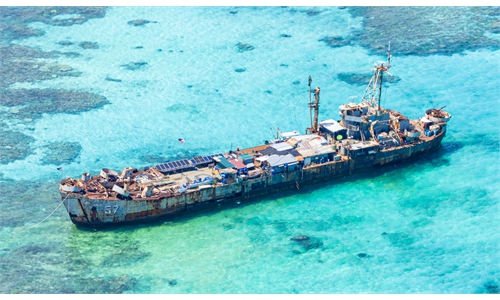Marcos Jr. picks words carefully in SONA regarding South China Sea, with 'midterm election, US' reliability on mind'

Philippines' President Ferdinand Marcos Jr.attended the Leaders' Plenary during the ASEAN-Australia Special Summit 2024 in Melbourne on March 6, 2024. Photo:AFP
Philippine President Ferdinand Marcos Jr. picked his words carefully in his remarks concerning the South China Sea in his State of the Nation Address 2024 (SONA), a sign of willingness to de-escalate the tensions, some experts said.
Manila, while seeking to maximize its interests, does not want and cannot afford a confrontation at sea with China, and Marcos Jr. needs to calculate the political risks and losses in the 2025 midterm elections, as well as US reliability, analysts said on Tuesday.
Marcos Jr. said in his SONA on Monday that "We continuously try to find ways to de-escalate tensions in the contested areas without counterparts, without compromising our position and principles."
The remarks came after China and the Philippines reached a "provisional arrangement" on managing the situation at Ren'ai Jiao, or Ren'ai Reef, in the South China Sea. In the past few months, the Philippines has significantly escalated its provocation over resupply to an illegally grounded warship at China's reef.
Marcos Jr.'s SONA speech and the arrangement show that his administration does not want direct confrontation with China, as it runs contrary to its own interests, Xu Liping, director of the Center for Southeast Asian Studies at the Chinese Academy of Social Sciences, told the Global Times on Tuesday.
Both China and the Philippines hope the frictions in Ren'ai Jiao will not lead to broader tension in the South China Sea and are willing to make de-escalation efforts, Xu said.
But considering the Philippines' record of breaking a "gentleman's agreement," Ding Duo, a deputy director of the Institute of Maritime Law and Policy at China's National Institute for South China Sea Studies, said if the Philippines abuses China's flexibility and patience regarding the new arrangement as an expedient, and then goes back on its word, it will pay a heavier price for its repeated mistakes.
Chinese Foreign Ministry spokesperson Mao Ning on Tuesday reiterated the provisional arrangement was made based on the principled position of China.
"We take note that the Philippine side said it's ready to implement the arrangement it reached with China. We hope the Philippines will keep its word. We call on the Philippines to not to backpedal, not to create problems, and not to do anything that would complicate the situation.," Mao said at the routine press briefing.
Xu cited another two factors behind Marcos Jr.'s nuanced changes in tone and the realization of the arrangement.
With the 57th ASEAN Foreign Ministers' Meeting and related meetings to be held, a positive atmosphere is needed for negotiations on the South China Sea Code of Conduct, according to Xu.
Xu also mentioned the midterm elections in 2025. After Vice President Sara Duterte's resignation from cabinet posts, Marcos Jr. has to consider the risks of a collapse of their political alliance and its negative impact on the elections, Xu said.
Sincerely or not, the US said it "welcomed the diplomatic efforts" to de-escalate tensions in the South China Sea. US assistant secretary of state for East Asian and Pacific affairs Daniel Kritenbrink said as he announced that Secretary of State Antony Blinken would travel to the Philippines in a show of support, media reported. The US and the Philippines will have 2+2 dialogue between foreign and defense ministers in Manila on July 30.
Obviously, the US sees the Philippines as a convenient pivot for its "Indo-Pacific Strategy" in the South China Sea and also hopes to utilize the Southeast Asian country to intervene in the Taiwan question if necessary, analysts said.
Marcos Jr.'s administration is making deals with the US with an eye on upgrading its military equipment, more investment and strengthening its capability in the South China Sea, Xu said, but since the US has great uncertainty in its domestic politics, Manila should think carefully about how far the US' promises can be fulfilled.

